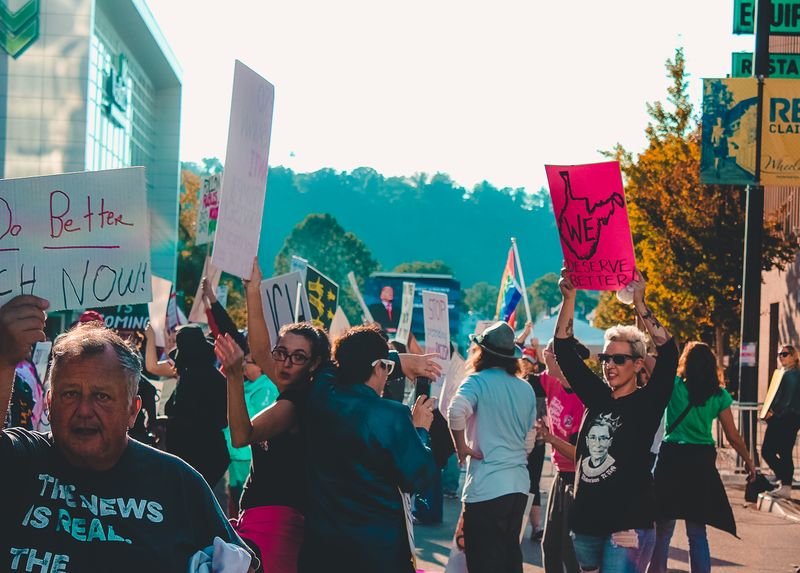Just Stop Oil Protesters Arrested at Open Championship
The Incident
Four individuals were arrested after Just Stop Oil protesters targeted the Open Championship at the Royal Liverpool Golf Club in Hoylake, England. The demonstration took place on Friday and sought to interrupt play at the iconic 17th hole. Footage from the event shows protesters attempting to access the green, with smoke bombs in the group’s branded orange color being set off. While one protester appeared to be sitting on the playing green, security personnel detained others. Images captured after the incident showed two individuals wearing ‘Just Stop Oil’ shirts being led away by the police.
The Response
Merseyside Police confirmed the arrest of four people following the incident. They were apprehended on suspicion of conspiracy to commit criminal damage and public nuisance. Authorities expressed their respect for the right to protest and freedom of expression but emphasized that antisocial behavior and disorder would not be tolerated. The police and the Royal & Ancient (R&A) management were determined to ensure that any protest activities did not disrupt the event. Contingency plans were in place to maintain the safety of visitors and to minimize any disruption caused by the protests.
Context and Previous Protests
This summer, the Open Championship joined Wimbledon and the Ashes as major sporting events targeted by protesters advocating for action against climate change. These demonstrations aim to raise awareness about the dangers posed by oil consumption and the need for urgent action. The incident at the Lord’s cricket ground, where England cricketer Jonny Bairstow removed a protester during a Test match, serves as a reminder of the potential risks involved in attempting similar actions during sporting events.
Golfer’s Reactions
Ahead of the Open Championship, golfers were warned about potential protests and advised against taking matters into their own hands. Masters champion Jon Rahm commented on the situation, stating, “I do have a reputation, so I hope they don’t catch me on a bad hole. I know they’re going for an impact. I saw a couple of them intervening in Wimbledon, and obviously this looks like it could be a perfect spot. But we have nothing to do with it.”
Editorial
A Clash of Priorities
The protests that took place at the Open Championship raise important questions about the intersection of sports, activism, and environmental issues. On one hand, sporting events provide a platform for raising awareness and inspiring change. They attract a large audience, capturing the attention of millions, and serve as a stage for expressing concerns.
However, it is equally important to consider the impact of such protests on the integrity of the sporting event itself. The disruption caused by these demonstrations can overshadow the intended message and undermine the sporting ideals of fair play, competition, and respect.
The Right to Protest
The right to protest and express one’s views is a fundamental pillar of democratic societies. Freedom of speech and assembly empower individuals to advocate for change, challenge the status quo, and hold institutions accountable. These demonstrations draw attention to critical concerns, such as climate change and its consequences, urging action and prompting public debate.
However, protests must be conducted responsibly and within legal boundaries. While activism can effectively prompt change, it should not infringe upon the rights and privileges of others or disrupt public events. Striking a balance between advocating for important causes and respecting the rights of others is crucial for sustaining a healthy and constructive democratic society.
Engaging Sporting Figures and Institutions
Sporting figures, institutions, and governing bodies play a vital role in shaping the conversation around activism and change. Public figures within sports have the opportunity to use their platform to contribute positively to societal discussions. Open and honest dialogue can help bridge the gap between opposing viewpoints and lead to meaningful change.
Sports federations and governing bodies should engage in open conversations with activists and listen to their concerns. This dialogue can facilitate a better understanding of the issues at hand and help develop strategies to tackle them effectively. Collaboration between athletes, organizers, and activists can create a more inclusive and impactful approach to addressing critical issues.
Advice
A Responsible Approach to Protest
For activists seeking to raise awareness and advocate for change at sporting events, it is essential to plan and execute protests responsibly and respectfully. Here are a few considerations for effective and responsible activism:
1. Planning: Plan protests in advance, considering the location, timing, and potential impact on the event and participants. Coordinate with local authorities to ensure safety and legality.
2. Peaceful Demonstrations: Emphasize the importance of peaceful protests. Violence or disruptive actions can undermine the intended message and lead to negative publicity.
3. Messaging: Clearly communicate the purpose and message of the protest. Provide educational materials and engage in conversations with spectators to promote understanding and dialogue.
4. Collaboration: Seek opportunities for collaboration with sporting figures, institutions, and governing bodies. Engage in constructive dialogue to amplify the message and explore avenues for change.
5. Respect Boundaries: Understand the limitations and guidelines set by organizers and authorities. Respect the rights of other attendees and ensure that protests do not infringe upon their experience.
6. Long-Term Engagement: Extend activism beyond the protest itself. Continue to engage with relevant stakeholders, participate in public debates, and advocate for change through various channels, such as social media, community organizations, and political engagement.
By adopting a responsible approach to activism, individuals can effectively raise awareness, provoke meaningful conversations, and contribute to a broader dialogue on pressing issues, such as climate change.
Note: The photographs included in this report are for editorial use only and are sourced from various news agencies.

<< photo by Rosemary Ketchum >>
The image is for illustrative purposes only and does not depict the actual situation.
You might want to read !
- Billy Horschel’s Unconventional Role: Assisting Security in Removing Just Stop Oil Protesters
- “Bunker Modifications: Addressing Complaints in Open Official’s Response”
- Riding on Redemption: Zak Crawley’s Triumph Under Captain Ben Stokes
- Greta Thunberg: Potential imprisonment for protesting
- Swedish Authorities Take Legal Action Against Greta Thunberg for Oil Port Blockade
- Man is arrested at The Open and led away in handcuffs in dramatic fashion – A closer look at the increasing security measures at major sporting events.
- The Rise of Christo Lamprecht: Sharing the Lead at the Open Championship
- “Remembering the Timeless Voice: An Ode to the Iconic Tony Bennett”
- Nigel Farage’s Demands Met as Banking Boss Issues Apology
- “Exploring the Exciting Engagement of Renee Zellweger and Ant Anstead”




